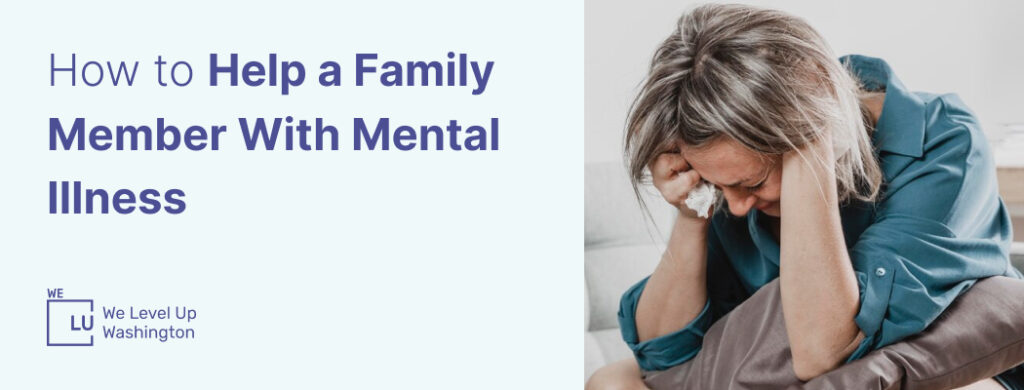Your family is your rock — your source of unconditional understanding and love. You want nothing but the best for them, so when someone in your family starts to display symptoms of a mental disorder, it’s only natural you’d want to do whatever you can to make it all go away. What you’ll soon discover is that dealing with a family member with mental illness is a lot harder than it may seem, although that’s not a reason to lose all hope! With a little effort and a lot of assistance from our Washington State behavioral health center, you won’t only learn how to help a family member with mental illness, but you’ll also learn how to thrive while at it!
Skip to:
Mental health issues in Washington
You suspect your loved one is affected by the ailment of the mind, but is this something that bothers others in Washington State? Let’s consult the numbers!
About 12% (± 1%) of adults in Washington reported poor mental health for 14 or more days in the month in 2016, as per the 2018 Washington State Health Assessment. This rate has been consistent since 2011!
Looking deeper at the details, we can also see that poor mental health was more commonly reported by women, young adults under the age of 24, and among American Indians and Alaskan natives.

Common mental health issues
Unfortunately, your loved one falls under the above statistics. But what are they going through? Truth be told, understanding their exact mental state might not be feasible. Nevertheless, identifying the type of mental illness that is plaguing them can somewhat facilitate the coping process. That said, some of the most frequently diagnosed cases include:
- Schizophrenia. This complex mental disorder amplifies an individual’s detachment from the real world. Both the person suffering and the observers can find it profoundly unsettling.
- Bipolar disorder. This condition induces substantial fluctuations in mood, triggering emotional peaks (mania or hypomania) and troughs (depression). These swings inevitably impact sleep patterns, energy levels, behavior, and one’s thinking.
- Major depressive disorder, known in simpler terms as depression, is characterized by continuous feelings of profound sadness and a diminishing interest in everyday activities. This condition vastly disrupts routine life.
- Antisocial personality disorder is a condition where individuals often ignore moral values and principles. Deceit and manipulation are prevalent traits that they exhibit. The direct effect of these actions often harms family relationships, demanding a subtle yet effective approach towards understanding and providing support.
- Narcissism is often displayed as a feeling of superiority, a craving for constant attention and appreciation, and an absence of understanding or concern for others. The lack of treatment can lead to strained relationships within the family. This means it’s important to recognize the signs of a narcissistic family member before the condition has taken its full toll.
- There’s another significant contributor to mental health issues — generational family trauma. This trauma signifies emotional and psychological injuries passed down from one generation to the next. Due to its possible link to anxiety, depression, and behavior patterns that harm familial bonds, it’s clear that this type of trauma can have severe repercussions.

Are you dealing with a family member with mental illness?
Noticing when a loved one may require assistance with their mental state requires monitoring shifts in their demeanor, feelings, and overall health condition. Here are some indications and warning signs to be on the lookout for:
- Social withdrawal. An apparent decrease in enthusiasm for being around friends or relatives and partaking in activities they previously enjoyed.
- Changes in performance. Whether it’s at their jobs or school, an observable drop in performance can be a sign something’s not quite right.
- Emotional oscillations. Pay attention to severe mood variations, such as uncharacteristic highs, being excessively emotional, or unusually moody.
- Changes in eating or sleeping patterns. Unusual weight loss or gain, trouble sleeping, or sleeping too much could indicate a possible mental disorder is at play.
- Substance abuse. An increase in the consumption of alcohol or drugs could indicate a possible struggle with a mental illness.
- Talk of self-harm or ending one’s life. Mental pain might drive someone to talk about self-harm or contemplate suicide. These signs must not be overlooked and must be addressed immediately within a professional setting.
Get Help. Get Better. Get Your Life Back.
Searching for Accredited Dual Diagnosis Mental Health Centers Near You?
Even if therapy failed previously, or are in the middle of a difficult crisis, we stand ready to support you. Our trusted behavioral health specialists will not give up on you. When you feel ready or just want someone to speak to about counseling alternatives to change your life call us. Even if we cannot assist you, we will lead you to wherever you can get support. There is no obligation. Call our hotline today.
FREE 24/7 Dual Diagnosis Mental Health Services HotlineAcknowledging the problem before getting help for a family member with mental illness
Often, the person struggling may not recognize the severity of their condition. This makes dealing with a family member with mental illness even tougher. They might even be in denial about needing help. This is why they need you. They need you to acknowledge the problem. You should talk openly to them. Start a conversation in a non-judgemental and supportive way. Express your concerns based on specific behaviors you have noticed rather than labeling or diagnosing them. Also, let them know you’re there to support them whenever they need you. This might mean helping them find professional help or just being there to listen.
How to help a family member with mental illness?
Supporting a family member with mental illness involves several practical and emotional steps. To understand this better, let’s explore the following aspects:
- Education and awareness
- Communication
- Seeking professional help
Education and awareness
If you want to help your family member with mental illness, you need to be aware of what’s bothering them. Here are a few facts that explain why exactly education and awareness are important.
- Stigma may prevent people from seeking help. Contribute to reducing this stigma by educating yourself (and others, perhaps). In doing so, you’ll make it easier for your loved one to open up and seek assistance.
- Knowing more about what your family member is experiencing can lead to improved communication. You’ll be more equipped to ask relevant questions and listen, but also provide responses that are empathetic and adapted to their emotional state.
- Recognizing the early signs of mental health conditions can lead to quicker intervention, which can significantly improve outcomes. What’s more, early intervention can sometimes prevent conditions from worsening.
- Mental health conditions have a range of treatment options. Inform yourself on what these are to support your loved one in making decisions about their treatment plan.

How can you educate yourself on the issue?
It’s clear that knowing a lot on the subject of mental health is preferred. But how can you actually get the full scope of information? Well, you can:
- Utilize reputable sources to learn about mental health conditions, treatments, and coping strategies.
- Attend workshops or seminars focused on mental health.
- Learn how to get help for a family member with mental illness by speaking with professionals who can provide a deeper understanding of your loved one’s condition.
- Join support groups, as they can offer personal insights and experiences from others who have been in similar situations.
Communication
When talking to your family member with mental illness, you need to be sensitive, patient, and understanding. Here are some tips on how to communicate in a supportive manner:
- Find a quiet, private space where you won’t be interrupted. Ensure it’s a time when both of you feel calm and not rushed.
- Start the conversation with care and concern. Use “I” statements to express your feelings and avoid blaming or criticizing. For example, say, “I’ve noticed you’ve been feeling really down lately, and I’m worried about you,” instead of, “You’ve been acting depressed.”
- Listening is just as important as speaking. Give your family member your full attention, show empathy, and validate their feelings by saying things like, “It sounds like you’re going through a really tough time.”
- It’s crucial to approach the conversation without judgment. Mental health issues are not a choice, and your loved one needs to feel safe and supported.
- While it’s natural to want to fix the problem, offering too many solutions too quickly can be overwhelming. Instead, ask how you can support them. Sometimes, just being there and listening is what they need most.
- Understand that your family member might not be ready to talk or seek help immediately. Let them know you’re there for them whenever they’re ready.
- After your initial conversation, check up on them periodically. This shows that you care and are there for them in the long term, not just in a moment of crisis.

Do you need professional help with mentally ill family member?
Between 2014 and 2015, 245,000 adults (aged 18 and above) in Washington — a terrifying total of 4.5% of the adult population —have thought of suicide at least once over the course of a year. Thoughts of ending a life aren’t something to dismiss, especially when the person who has them is the one you love. For that reason, it’s vital you find the right kind of help, and the sooner you do it, the better! But before you have decided on the best option, let’s understand what options there actually are!
How are inpatient and outpatient care different?
As you are thinking of the best treatment opinion for your family member, you’ll definitely stumble upon inpatient and outpatient treatment. But what exactly are these two, and how do they differ from each other?
In general, inpatient care involves the person staying in a hospital or a residential treatment facility for a certain period. This option is recommended if your family member is in crisis, poses a risk to themselves or others, or needs intensive support and treatment that cannot be provided at home. Inpatient care comes with 24-hour supervision and support, a structured environment, and immediate access to psychiatric services.
Now, to understand the difference between inpatient vs outpatient mental health care, let’s see what we mean by outpatient. Outpatient care allows the person to live at home while receiving treatment through visits to a mental health professional or a treatment center. This can include therapy sessions, psychiatric evaluations, and medication management. Outpatient care is suitable for those who are stable enough to not require constant supervision but still need regular support and treatment.
End the Emotional Pain. Get Your Life Back.
Feeling Depressed, Anxious or Struggling with Mental Health Illness? Get Safe Comfortable Mental Health Dual Diagnosis High-Quality Therapy From Counselors That Care. Begin Your Recovery Now.
Hotline: (509) 348-4077

Step-by-step on how to get help for family member with mental illness
While looking at inpatient mental health facilities in Washington State and trying to decide on the right one, there are some things you need to do:
- Get a thorough assessment by a mental health professional. This can help determine the severity of the mental illness, how to best support a family member with mental illness, and whether inpatient or outpatient care is more appropriate.
- Research facilities and professionals who specialize in treating the specific mental health condition your family member is experiencing.
- Explore insurance coverage. If you have AETNA mental health coverage, for instance, check with your insurance provider to see what types of mental health care are covered under your plan. This can significantly influence your choice between inpatient and outpatient care options.
- Don’t hesitate to consult with multiple professionals to get a second or a third opinion. This can help ensure that the recommended treatment plan is actually adapted to the needs of your family member.
- If considering inpatient care, visit the facility in advance to get a sense of the environment and the type of care provided.
- For inpatient care, there might be a waiting period. Use this time to prepare, both emotionally and practically for getting help for a family member with mental illness. Discuss the process with them to make sure they understand and are as comfortable as possible with the decision.

When actually deciding on the facility, look for ones that specialize in treating the specific mental health condition your family member is experiencing. Facilities with specialized programs will often have more experience and resources to treat their condition. Also, see to it that the chosen facility is accredited by reputable organizations and licensed by the state. Then, inquire about the treatment methods used. The best facilities offer a range of therapies, including individual counseling, group therapy, medication management, and holistic therapies.
Don’t forget to check the qualifications of the staff, including psychiatrists, psychologists, therapists, and support staff! A multidisciplinary team is often the most effective in providing comprehensive care. Ideally, the chosen center should also allow for family participation in the treatment process. We are talking about family sessions, education programs, and regular updates on the patient’s progress (that don’t break patient confidentiality, of course).
First-class Facilities & Amenities
World-class High-Quality Mental Health Services & Behaviroal Health Substance Abuse Treatment
Rehab Centers TourRenowned Mental Health Centers. Serene Private Facilities. Inpatient Rehab Programs Vary.
Mental Health Helpline: (509) 348-4077Proven recovery success experience, backed by a Team w/ History of:
15+
Years of Unified Experience
100s
5-Star Reviews Across Our Centers
10K
Recovery Success Stories Across Our Network
- Low Patient to Therapist Ratio
- Comprehensive Dual-Diagnosis Treatment
- Complimentary Family & Alumni Programs
- Coaching, Recovery & Development Events
- Comfortable Onsite Medical Detox Center
Why choose We Level Up Washington
It’s become evident that, when coping with a family member with mental illness, you need to choose the right treatment center. We Level Up Washington makes the choice easy for you. With special programs adapted for different mental health issues, we are here to support your loved one — and you — every step of the way.
Our programs include everything from one-on-one talks to group sessions and more, all designed to suit your loved one’s needs. Thanks to a team made up of caring professionals, we understand you (really) and do everything we can to help. We also know how important you and the rest of the family are to your loved one’s recovery, so we include you in the process by keeping you updated at all times.
And when the time comes for your family member to go home, we will help plan for what comes next and ensure they continue to get the support they need.
We Level Up Washington is a place where your entire family can find hope. It’s also the place where your loved one can start recovering with you by their side.

Help a family member with mental illness and make your relationship stronger
If you want to help a family member with a mental illness, you need to nurture a positive, supportive environment that celebrates every achievement, no matter how small. Recognize the ups and downs of the recovery process with patience and compassion, and show a deep commitment to helping them, no matter what happens. And know this: despite your family member receiving treatment at a facility that may be far from home, you two can still be close. Thanks to family therapy held at our grounds, you can relish activities that strengthen your bond and give you moments of joy, but you can also enjoy a sense of normalcy during the challenges.
Sources:
- 2018 Washington State Health Assessment. doh.wa.gov/sites/default/files/legacy/Documents/1000/SHA-MentalHealth.pdf.
- Behavioral Health Barometer Washington, Volume 4. www.samhsa.gov/data/sites/default/files/Washington_BHBarometer_Volume_4.pdf.
World-class, Accredited, 5-Star Reviewed, Effective Mental Health Dual Diagnosis Programs. Complete Integrated Inpatient Rehab with Free Post Discharge Therapy Planning.
Hotline: (509) 348-4077End the Emotional Pain Rollercoaster. Gain Stability & Happiness Through Recovery Treatment. Start Mental Health Counseling Today. Get Free No-obligation Guidance by Behaviroal Health Specialists Who Understand Mental Health Recovery.
Experience Transformative Recovery at the We Level Up Treatment Center.
See our authentic success stories. Get inspired.
Get the help you deserve.



Start a New Life
Begin with a free call to a behavioral health treatment advisor. Learn more about our dual-diagnosis programs. The We Level Up treatment center network delivers recovery programs that vary by each treatment facility. Call to learn more.
- Personalized Care
- Caring Accountable Staff
- World-class Amenities
- Licensed & Accredited
- Renowned w/ 5-Star Reviews





